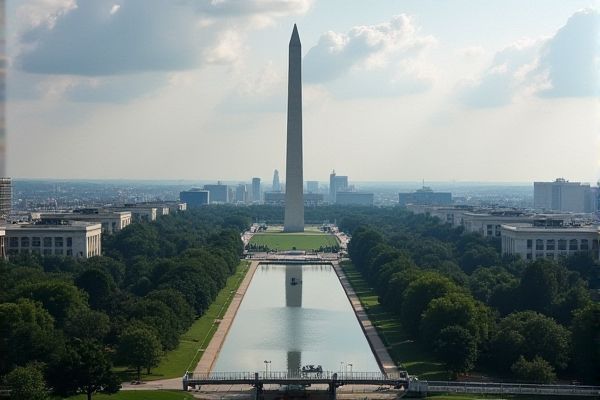
Dining and food culture in Washington: Diverse culinary scene. Farm-to-table emphasis. Ethnic food diversity. Seafood specialties. Coffee culture. Food trucks popularity. Wine regions nearby. Craft breweries prevalence. Vegan and vegetarian options. Farmers markets abundance.
Diverse culinary scene.
Washington, D.C.'s food scene is remarkably diverse, reflecting the city's international influence with a wide range of cuisines, including Ethiopian, Salvadoran, Indian, Afghan, and Latin American, as well as traditional American dining options like steak-and-potatoes restaurants and historic eateries like Old Ebbitt Grill. The city's culinary landscape is enriched by food halls like Union Market and La Cosecha, which offer a variety of global flavors and dining experiences.
Farm-to-table emphasis.
In Washington, the farm-to-table dining scene is vibrant, with numerous restaurants across the state emphasizing the use of seasonal, locally sourced ingredients. Restaurants like The Herbfarm in Woodinville, Crafted in Yakima Valley, and Wild Sage Bistro in Spokane showcase the best of the Pacific Northwest's produce, meats, and seafood, highlighting the benefits of direct connections between local farmers and consumers. To learn more about this culinary movement, explore the Farm-to-Table Dining in Washington website, which delves into the essence of this growing trend.
Ethnic food diversity.
Washington, D.C., boasts a highly diverse food culture, with restaurants blending flavors and techniques from various international cuisines, such as Asian-inspired tacos and Mediterranean-infused pizzas. This dynamic culinary scene reflects the city's multicultural heritage and offers a wide range of unique experiences. To explore more about this vibrant food scene, you can visit the Diverse Food Scene of Washington, D.C., which highlights how the city's unique gastronomic landscape is shaped by its diverse community.
Seafood specialties.
Washington State is renowned for its abundant seafood, including salmon, oysters, Dungeness crab, scallops, halibut, shrimp, and clams, with a strong emphasis on sustainable fishing practices and a significant contribution to the local economy and cultural traditions. The state boasts a diverse range of seafood specialties, such as Pacific salmon, Dungeness crab, geoducks, and various oyster varieties, which are often featured in local restaurants and markets, highlighting the state's rich marine bounty. For more details on these offerings, visit Eat Local First, where you can explore the array of local produce that defines Washington's culinary landscape.
Coffee culture.
Seattle's coffee culture is a vibrant and integral part of the city's identity, dating back to the early 20th century with the founding of Pioneer Coffee Company in 1910 and the first Starbucks in 1971. It is characterized by numerous local roasters, cafes, and specialty shops that have significantly influenced the global specialty coffee movement. To explore more about the city's rich coffee history and its role in tourism, visit the Seattle Sailing Ship website for an in-depth look at how this culture continues to thrive today.
Food trucks popularity.
The popularity of food trucks in Washington, DC, is driven by their diverse cuisine, convenience, and cultural experiences. With hundreds of trucks offering a wide range of international and fusion dishes, they thrive in areas like the National Mall, downtown business districts, and at special events and festivals. For more insights on this trend, you can visit the Cultural Daily website, which explores the vibrancy and growth of this culinary phenomenon.
Wine regions nearby.
Washington State is home to several prominent wine regions, including the Columbia Valley, Yakima Valley, Walla Walla Valley, Red Mountain, and Horse Heaven Hills. Each of these regions offers unique terroir and a diverse range of grape varieties, with many wineries and vineyards that contribute to the state's robust wine culture. Explore more about the distinctive characteristics of Washington's wine regions by visiting the Washington Wine Club.
Craft breweries prevalence.
Washington State boasts a significant presence of craft breweries, with a notable 459 operational breweries in 2023. This ranks it among the top states in the nation, with a density of 7.8 craft breweries per 100,000 adults over the age of 21. The state is home to a large number of breweries, especially in the Seattle area, and is renowned for its vibrant craft brewing scene. To find out more about how Washington ranks and details about its craft brewing landscape, visit the States Most Craft Breweries 2023 Map on VinePair's website.
Vegan and vegetarian options.
Washington, D.C. offers a diverse range of vegan and vegetarian dining options, featuring restaurants like DC Vegan, Fruitive, Chaia, Pow Pow, and Lapis. Each establishment provides unique culinary experiences, from Italian-American to Mexican, Asian, and Afghan cuisine. Many of these options are 100% vegan or highly vegan-friendly, making it a haven for plant-based enthusiasts. For more details on these vibrant offerings, check out the comprehensive guide on Vegan Food in Washington D.C..
Farmers markets abundance.
Washington State boasts a vibrant food culture, with numerous farmers markets offering a wide array of locally grown produce, artisanal goods, and unique crafts. Markets like the Jefferson County Farmer's Market, Pybus Public Market, and West Seattle Farmer's Market provide year-round access to fresh fruits, vegetables, baked goods, and other local products, highlighting the state's diverse agricultural resources and culinary heritage. For more information on these delightful markets, visit Only In Your State, which showcases the best of Washington's food culture and farmers markets.
